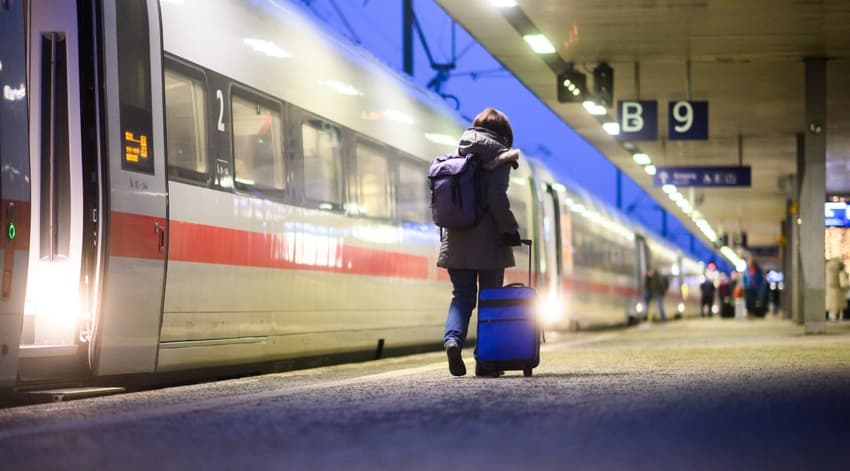Will Germany see more rail strikes in 2024?

Disputes between the German train drivers' union and Deutsche Bahn have made it a rocky few weeks on the railways. Can we expect to see even more strikes in 2024?
This year has not been an easy year so far for Deutsche Bahn and its passengers. It started with weeks of tough pay negotiations with the largest train union, the EVG, and is ending in deadlock with the small but powerful train drivers' union, the GDL.
After just a single round of talks on pay and working hours, the GDL called its first 20-hour strike on the 15th and 16th of November, accusing Deutsche Bahn of not taking the negotiations seriously.
A further round of talks on November 23rd and 24th ended with the GDL declaring the negotiations "failed" and calling a 24-hour national strike that ran from December 7th to December 8th.
READ ALSO: German train drivers union announces strikes after 'failed' talks
Both rounds of industrial action have paralysed train services across the country, with regional and local trains being put out of action, with just one in five long-distance trains remaining in operation.
With no sign of a resolution on the cards, it looks likely that the dispute will spill over into 2024 and result in longer strikes than we've seen so far.
Here's what we can expect in the coming months.
Could there be strikes before Christmas?
No. Though GDL boss Claus Weselsky originally refused to agree to a Christmas truce, he finally ruled out strikes over the festive period in November, allowing passengers to breathe a small sigh of relief.
The union is currently in the process of balloting its members on so-called "unlimited strikes", which would allow the union to stage much longer walk-outs than their usual 24-hour warning strikes.
These ballots will get counted on December 19th, according to Weselsky. This means any further strikes won't happen until after the New Year.
What can we expect in 2024?
With Christmas and ballot counting on the cards, the GDL has ruled out strikes until January 7th, but is warning that tough tactics will resume straight after that.
Speaking to the Augsburger Allgemeine newspaper on Wednesday, Weselsky said that "longer industrial action" could be expected from January 8th.
"We will break the railway's blockade," he said.
READ ALSO: Thousands of trains cancelled in Germany as strike hits passengers
Depending on the results of the members' ballot, future strikes could also last several days or even weeks at a time. That's because the union leadership needs its members' support if it wants to stage longer walk-outs next year.

Trains sit on the platform in Hanover during a 24-hour warning strike called by the German train drivers' union. Photo: picture alliance/dpa | Julian Stratenschulte
In his interview on Wednesday, Weselsky seemed confident that he could get the green light from members for longer strikes.
"There will be longer strikes in January after a successful ballot," he said. "There will be no more 24-hour strikes."
However, the union boss made it clear that there would be no unlimited strikes without an end date.
"We are responsible enough to not strike forever," he said.
What's the dispute all about?
With the expiration of the current collective agreement between the train drivers' union and Deutsche Bahn, the two sides have been trying to thrash out a deal on pay and conditions for the coming months.
The GDL is demanding a wage increase of at least €555 per month for a period of 12 months, as well as a 25 percent increase in bonuses for shift work and a tax-free payment of €3,000 to offset inflation.
Deutsche Bahn has countered this with the offer of an 11 percent pay rise over 32 months, along with a tax-free bonus of €2,850 for workers - an offer Weselsky describes as "too long and too little".
Despite their differences over pay, the main sticking point has been the union's demand to drop train drivers' working hours from 38 hours a week to 25.
READ ALSO: How to get compensation for delayed or cancelled trains in Germany
So far, Deutsche Bahn HR manager Martin Seiler has refused to negotiate on this issue, describing the proposal as "unworkable" in light of current staffing shortages.
On the GDL side, Weselsky has argued that reducing hours would make the profession more attractive and said that workers are willing to compromise.
"As far as implementation is concerned, we are prepared to compromise," he told the Augsburger Allgemeine. "We could start around 2025 and gradually reduce the working week from 38 to 35 hours by 2028."
If the deadlock continues, one way out could be for both sides to agree to a third-party arbitration process - a solution that helped the EVG and Deutsche Bahn reach an agreement earlier this year.
Another option would be to resume the talks - an option that Deutsche Bahn has said it is open to.
Comments
See Also
This year has not been an easy year so far for Deutsche Bahn and its passengers. It started with weeks of tough pay negotiations with the largest train union, the EVG, and is ending in deadlock with the small but powerful train drivers' union, the GDL.
After just a single round of talks on pay and working hours, the GDL called its first 20-hour strike on the 15th and 16th of November, accusing Deutsche Bahn of not taking the negotiations seriously.
A further round of talks on November 23rd and 24th ended with the GDL declaring the negotiations "failed" and calling a 24-hour national strike that ran from December 7th to December 8th.
READ ALSO: German train drivers union announces strikes after 'failed' talks
Both rounds of industrial action have paralysed train services across the country, with regional and local trains being put out of action, with just one in five long-distance trains remaining in operation.
With no sign of a resolution on the cards, it looks likely that the dispute will spill over into 2024 and result in longer strikes than we've seen so far.
Here's what we can expect in the coming months.
Could there be strikes before Christmas?
No. Though GDL boss Claus Weselsky originally refused to agree to a Christmas truce, he finally ruled out strikes over the festive period in November, allowing passengers to breathe a small sigh of relief.
The union is currently in the process of balloting its members on so-called "unlimited strikes", which would allow the union to stage much longer walk-outs than their usual 24-hour warning strikes.
These ballots will get counted on December 19th, according to Weselsky. This means any further strikes won't happen until after the New Year.
What can we expect in 2024?
With Christmas and ballot counting on the cards, the GDL has ruled out strikes until January 7th, but is warning that tough tactics will resume straight after that.
Speaking to the Augsburger Allgemeine newspaper on Wednesday, Weselsky said that "longer industrial action" could be expected from January 8th.
"We will break the railway's blockade," he said.
READ ALSO: Thousands of trains cancelled in Germany as strike hits passengers
Depending on the results of the members' ballot, future strikes could also last several days or even weeks at a time. That's because the union leadership needs its members' support if it wants to stage longer walk-outs next year.

In his interview on Wednesday, Weselsky seemed confident that he could get the green light from members for longer strikes.
"There will be longer strikes in January after a successful ballot," he said. "There will be no more 24-hour strikes."
However, the union boss made it clear that there would be no unlimited strikes without an end date.
"We are responsible enough to not strike forever," he said.
What's the dispute all about?
With the expiration of the current collective agreement between the train drivers' union and Deutsche Bahn, the two sides have been trying to thrash out a deal on pay and conditions for the coming months.
The GDL is demanding a wage increase of at least €555 per month for a period of 12 months, as well as a 25 percent increase in bonuses for shift work and a tax-free payment of €3,000 to offset inflation.
Deutsche Bahn has countered this with the offer of an 11 percent pay rise over 32 months, along with a tax-free bonus of €2,850 for workers - an offer Weselsky describes as "too long and too little".
Despite their differences over pay, the main sticking point has been the union's demand to drop train drivers' working hours from 38 hours a week to 25.
READ ALSO: How to get compensation for delayed or cancelled trains in Germany
So far, Deutsche Bahn HR manager Martin Seiler has refused to negotiate on this issue, describing the proposal as "unworkable" in light of current staffing shortages.
On the GDL side, Weselsky has argued that reducing hours would make the profession more attractive and said that workers are willing to compromise.
"As far as implementation is concerned, we are prepared to compromise," he told the Augsburger Allgemeine. "We could start around 2025 and gradually reduce the working week from 38 to 35 hours by 2028."
If the deadlock continues, one way out could be for both sides to agree to a third-party arbitration process - a solution that helped the EVG and Deutsche Bahn reach an agreement earlier this year.
Another option would be to resume the talks - an option that Deutsche Bahn has said it is open to.
Join the conversation in our comments section below. Share your own views and experience and if you have a question or suggestion for our journalists then email us at [email protected].
Please keep comments civil, constructive and on topic – and make sure to read our terms of use before getting involved.
Please log in here to leave a comment.